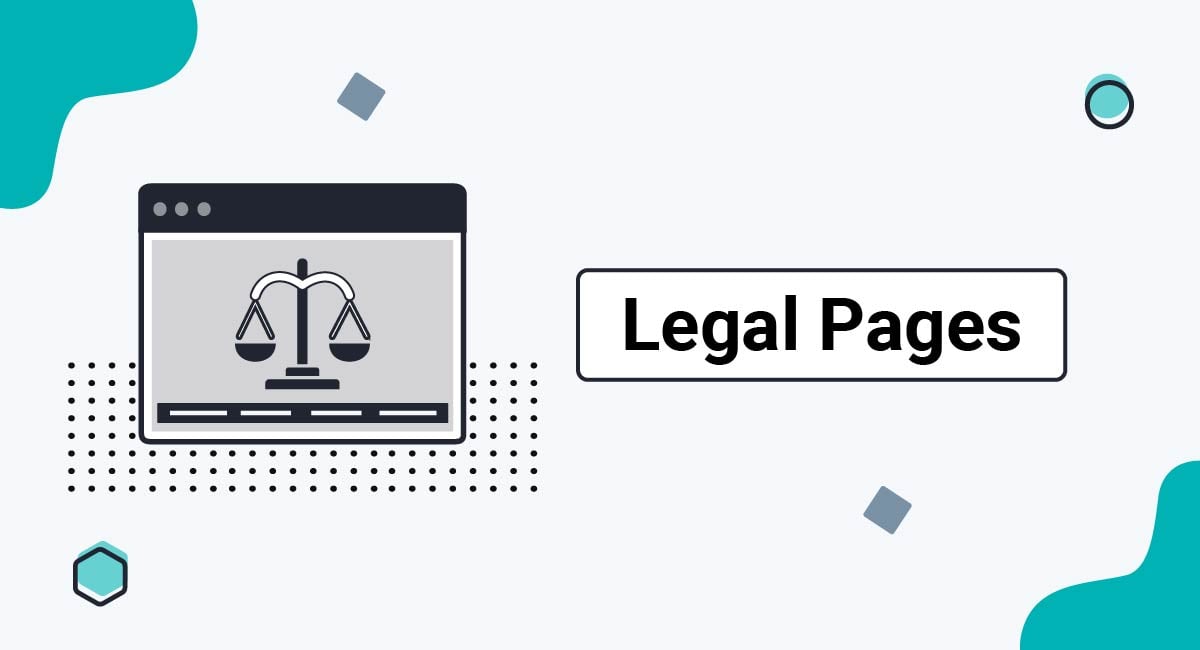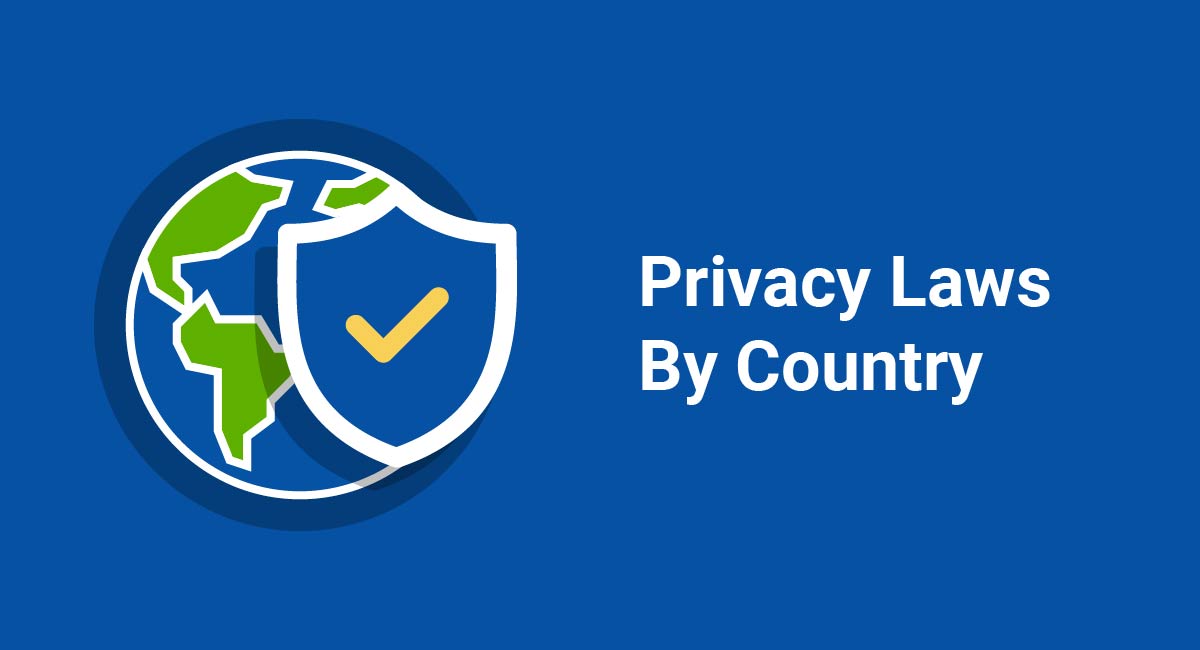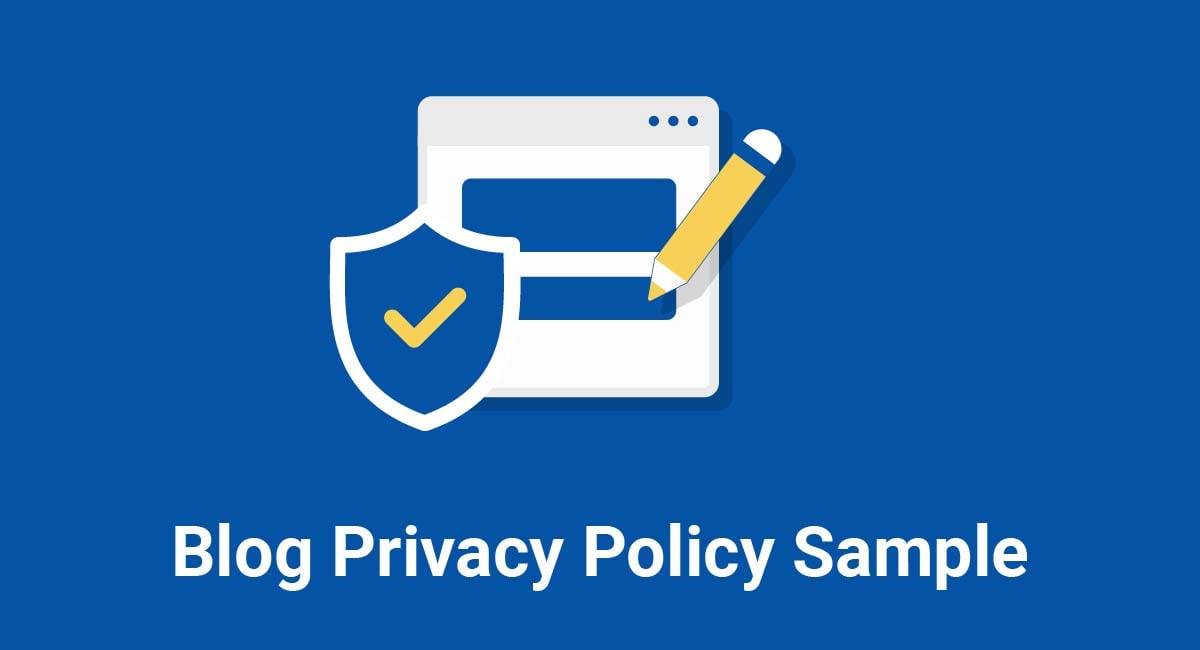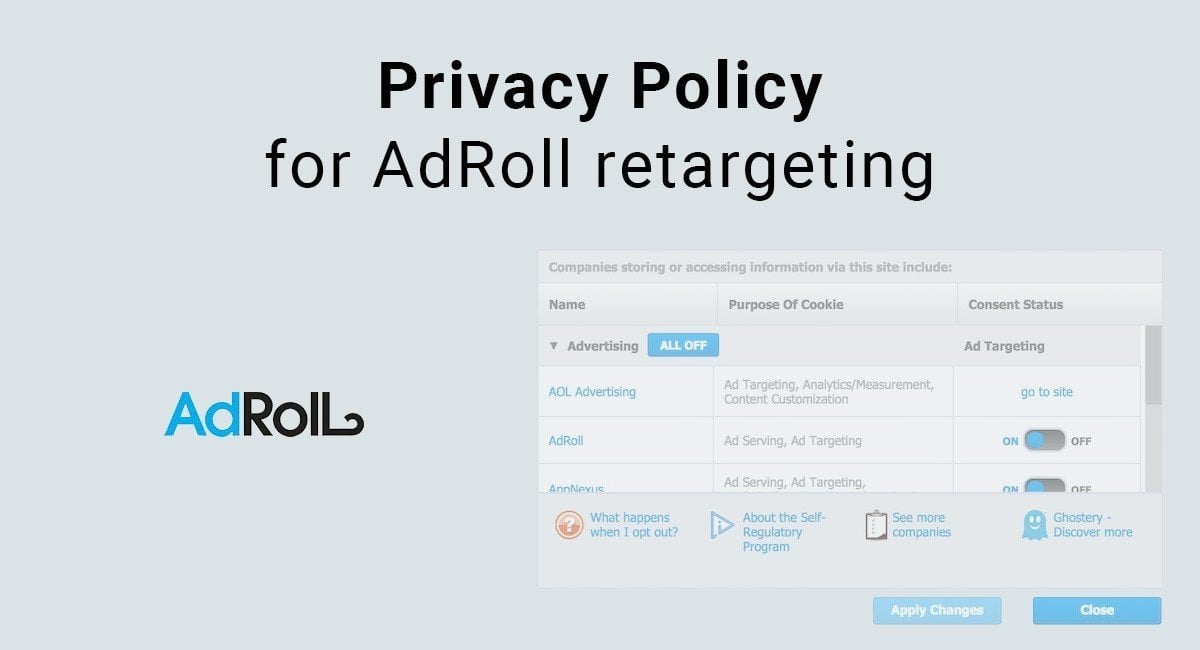Businesses may need to employ various types of legal pages on their websites or mobile apps. Some, like Privacy Policies, are required by law, while others, such as a Terms and Conditions agreement (T&C), are not. Regardless of legal demands, you may find that your company needs one or more legal pages for compliance and optimal operation.
In this article, we will go over the most common legal pages, walk you through a summary of what each requires, and explain why you may need it. In addition, you'll find a sample template for each type of legal page so you can quickly get started writing your own.
TermsFeed is the world's leading generator of legal agreements for websites and apps. With TermsFeed, you can generate:
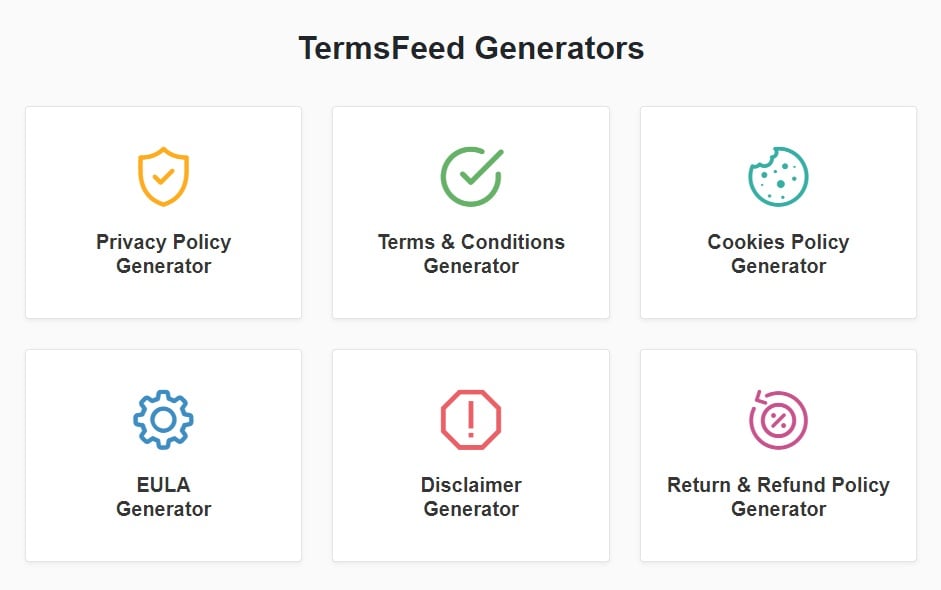
- 1. What are Legal Pages?
- 2. What is the Purpose of Legal Pages?
- 3. Who Needs Legal Pages?
- 4. A Privacy Policy
- 4.1. Privacy Laws
- 4.2. What Personal Data You Collect
- 4.3. How You Use the Information You Collect
- 4.4. How You Keep Information Safe
- 5. A Terms and Conditions Agreement
- 5.1. Benefits of Having a Terms and Conditions Agreement
- 5.2. Disclaimers and Limitation of Liability
- 5.3. Intellectual Property Rights
- 5.4. Termination of Accounts or Service
- 6. An End-User License Agreement
- 6.1. License Granting
- 6.2. Intellectual Property/Copyright Infringement
- 6.3. Termination of Licensing
- 7. A Cookies Policy
- 7.1. What Cookies Are
- 7.2. What Types of Cookies You Use
- 7.3. How Users Can Opt Out of Cookie Use
- 8. Return and Refund Policy
- 8.1. Your Conditions for Accepting Returns
- 8.2. The Type of Refunds You Provide
- 8.3. Any Fees Associated with Returns
- 9. A Disclaimer Page
- 9.1. Use at Your Own Risk Disclaimer
- 9.2. Errors and Omissions Disclaimer
- 9.3. Views Expressed Disclaimer
- 10. Summary
What are Legal Pages?
Legal pages are legal documents that act as agreements between a website or mobile app's owner, operator, or provider and the end user. Each type of legal page serves a unique purpose for both parties.
A website or app may be required to, or could greatly benefit from having one or more of the following common legal pages:
- Privacy Policy
- Terms and Conditions agreement
- End-User License Agreement (EULA)
- Cookies Policy
- Return and Refund Policy
- Disclaimers
What is the Purpose of Legal Pages?
The main purpose of legal pages, regardless of type, is to establish the conditions under which users may engage with a website, mobile app, or specific programs and services.
They also outline the primary legal obligations the website or mobile app's owner has toward its users.
Who Needs Legal Pages?
You need legal pages such as Privacy Policies, EULAs, Cookie Policies, or Return and Refund Policies if your company partially or fully:
- Engages in online marketing
- Has an ecommerce component
- Uses proprietary software
- Provides a third-party platform for others to buy and sell products or services, or
- Includes interactive elements, such as social media or forum activity where users actively engage with each other or you
Additionally, all companies with an online presence should have a T&C even though it's not legally required. Doing so can help you protect and maintain your rights while preventing the abuse of your website or mobile app by users.
Now, let's look at the most common legal pages, what they require, and why you may need them.
A Privacy Policy

A Privacy Policy is a legal document that informs users about the data your company collects, how it is collected, and how it is used. Additionally, a well-written Privacy Policy will let users know why you're collecting their information, how long you will store it, and who may access it.
You're likely collecting a lot of information about your users either to improve existing features, create new features, or testing the viability of different pricing schedules or even considering whether anyone will pay for your service.
Whenever you collect data about your users, you're collecting and storing their private information. The law in most countries requires that you deal with this private information in certain ways and disclose what you're doing.
The most effective way of covering off these privacy bases is to set up a Privacy Policy agreement and implement good privacy practices within your company to meet all your legal obligations.
Privacy Laws
There are a number of privacy laws around the world that require a Privacy Policy if you collect, use or share any protected personal information.
Here are some of these laws, with useful articles linked to each law for further details and specifics on that law:
- CalOPPA (USA/California)
- CCPA/CPRA (USA/California)
- PIPEDA (Canada)
- GDPR (EU)
- Privacy Act (Australia)
- Data Protection Act (UK)
For more privacy laws by country, check out our directory article Privacy Laws By Country.
In general, privacy laws require that a Privacy Policy set out the following information:
- What kind of personal data you will collect
- How you'll protect and store that personal data collected
- What you'll do with the personal data collected
- In what circumstances you'll release the personal data collected
- How your users can see what personal data you hold on them, and how they can change, delete, or update that data
- Dispute resolution
- Effective date of the legal agreement
- What changes were done to the legal agreement previously and how notices of these kind of updates would be sent to users
Here's how Art's International Bakery starts its Privacy Policy by stating that the Policy will describe some of the information noted above:
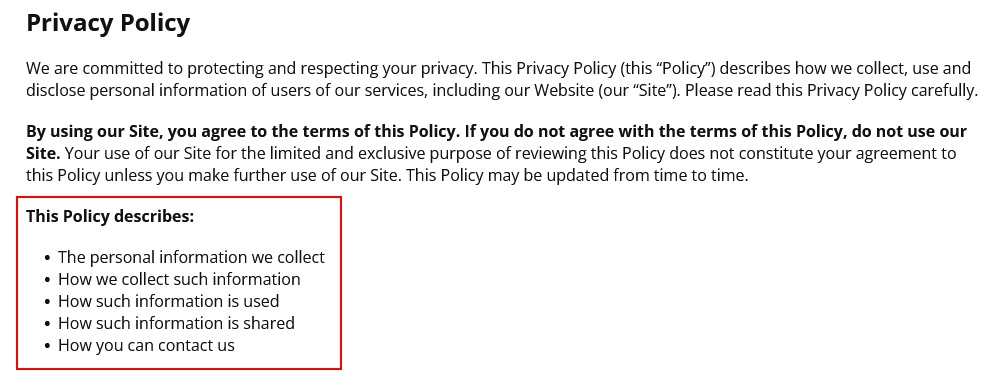
Many Privacy Policies have a table of contents near the very beginning of the document that highlights the major sections of the document and sometimes links to each.
Here's another example:
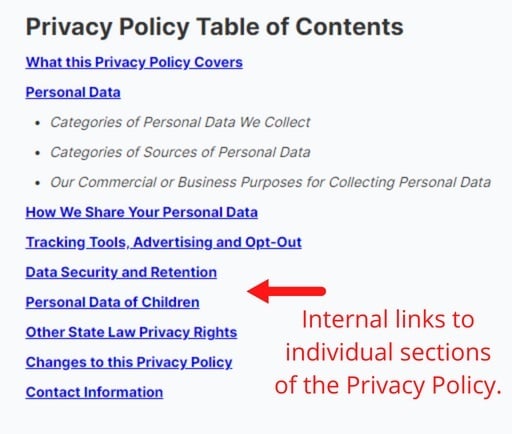
Most Privacy Policies will have various clauses depending on applicable laws and the type of business it is designed to cover. However, there are some clauses that almost every company should include in their Privacy Policies, especially if they collect personal data from website users.
Below are some of the essential clauses a Privacy Policy should contain.
What Personal Data You Collect
With the proliferation of privacy laws worldwide, a clause that lets your website users know what data you collect is vital. It's essential to let your visitors know from the start if you plan to collect information they're comfortable sharing.
Here's a sample of this kind of clause from Apple:
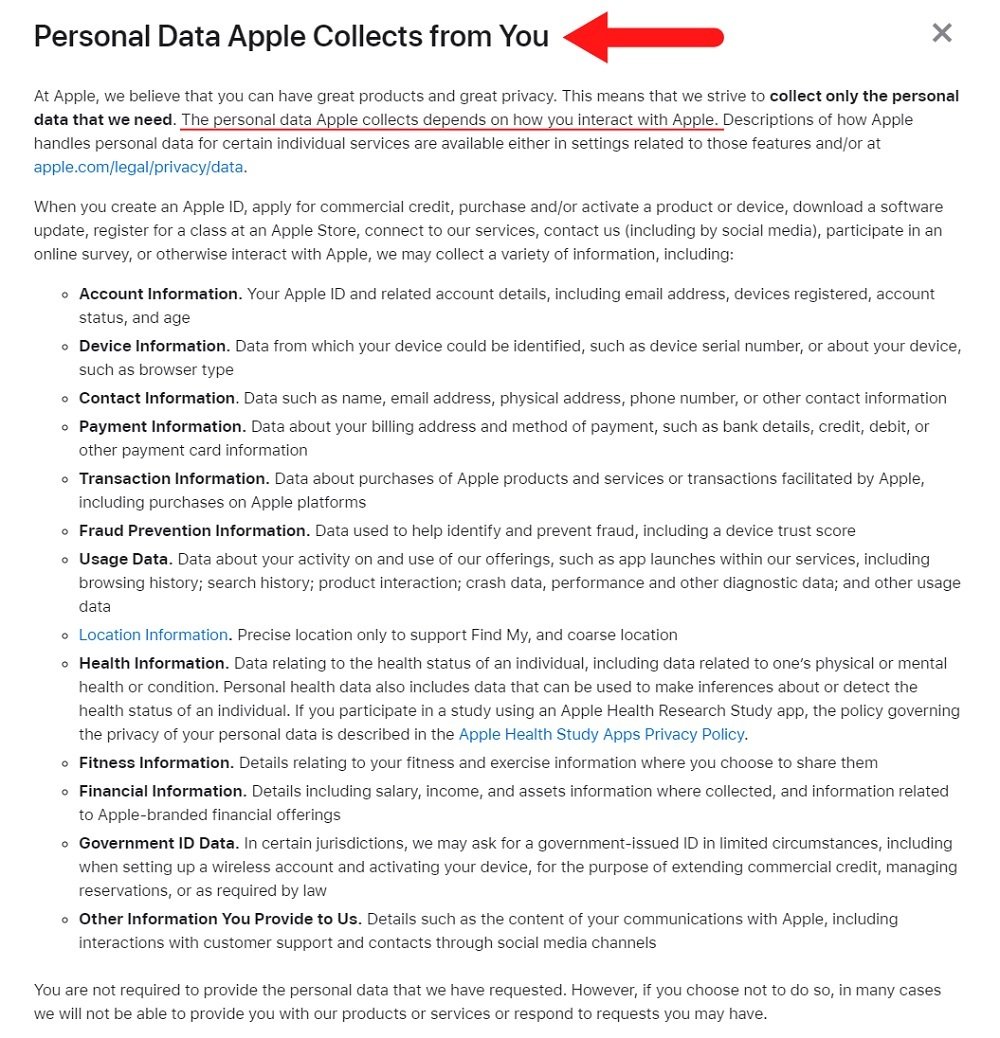
You should be as specific as possible in this clause, letting users know exactly what information you collect.
How You Use the Information You Collect
In addition to describing the information you collect, you need a clause that lets users know what you plan to do with it after you obtain it. This is important information to disclose because how one company may use visitors' data may be completely different from how another business will use it.
It is the website visitor's right to know, according to privacy laws.
Here's an example of how you can provide users with a short clause that outlines what is done with personal information, then linking to a more detailed page, which the visitor can read if they want further details:
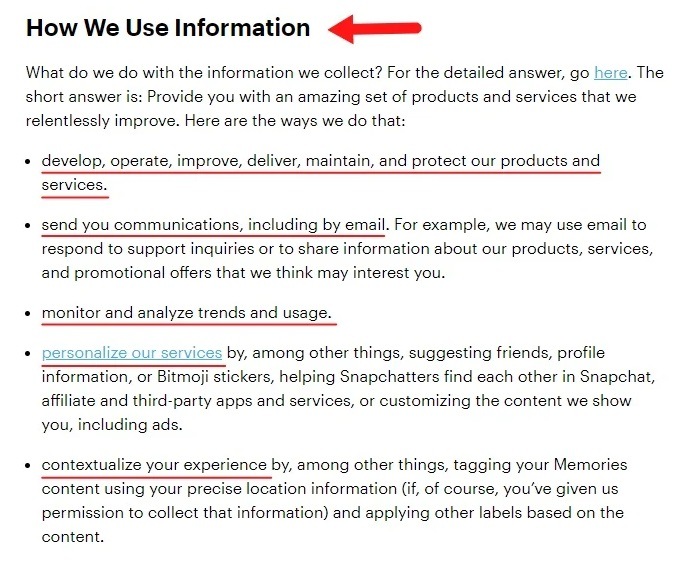
How You Keep Information Safe
A description of how you plan to keep personal data safe and secure is another essential clause to include in your Privacy Policy. Disclosing that you've implemented suitable security measures demonstrates trustworthiness and a responsible commitment to your visitors.
Here's how the social media platform Gettr writes this clause:
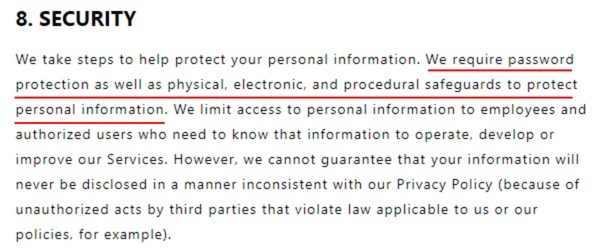
A Privacy Policy is one of the most important legal pages you can have since it's legally required in most cases. Make sure you're transparent about how you handle personal information, and make your Policy easy to locate.
A Terms and Conditions Agreement

A Terms and Conditions agreement (also called Terms of Service or Terms of Use) is a legal page that sets out the rules for both the use of your service or website and the relationship between you (the service owner) and your users.
This kind of legal agreement usually contains the following clauses:
- A list of definitions of key words and phrases
- The rights and responsibilities of users
- What is the proper or expected usage of the service or product
- Clauses related to intellectual property protection
- Information regarding the accountability for online actions, behavior, and conduct of users
- If your startup is developing a SaaS app, disclosures related to payment details such as membership or subscription fees
- Disclaimers and warranties
- Procedure for user accounts termination, if available
- Exclusion or Limitation of Liability clauses clarifying the service/product's legal liability for damages incurred by users
- Notification upon modification of this legal agreement
Benefits of Having a Terms and Conditions Agreement
While it is not one that is required by law, having a T&C is considered a best practice because it allows you to enforce your rules of conduct, protect your intellectual property, manage your website or service, and help limit your legal liability. This type of legal page is commonly used by companies in a variety of industries.
Having a good Terms of Service agreement protects you in a number of ways.
First, by establishing the proper or expected usage of the service or product (as well as accountability for user behavior or conduct, and user account termination procedures) you can ensure that rogue users are not permitted to take actions that harm you, your service, or your other users.
Intellectual property protection clauses are also important, as they set out how your trademarks, branding, and copyrighted material can be used. If your website or app allows user-generated content, make sure that you establish that your app or website has a license to use that content for the purpose of operating your service.
Disclaimers and warranties are especially important for your service/product, as the product may be not fully developed and may not have all features that a user would expect.
Information related to warranties in your Terms of Service agreement can set clear expectations for what your service can and will do, and what it will not.
Typically, a T&C will begin with an introduction, like this one:
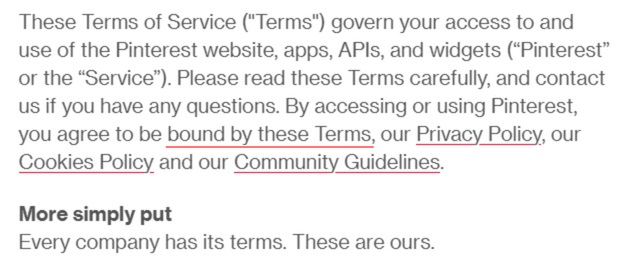
Below are some of the more important and common clauses you'll find in most Terms and Conditions agreements.
Disclaimers and Limitation of Liability
A clause that limits liability is essential in your Terms and Conditions agreement because it helps prevent users from taking you to court over such things as a failure of your software, app, or website, viruses, or shutdowns.
In essence, this clause is one where you'll want to ensure that users understand that using your services comes with risk (even if the risk is small) and that you won't be held accountable for damages that may arise from using them. It may also contain other disclaimers.
Here's an example from ZenDesk that uses broad language so that it covers as many bases as possible:
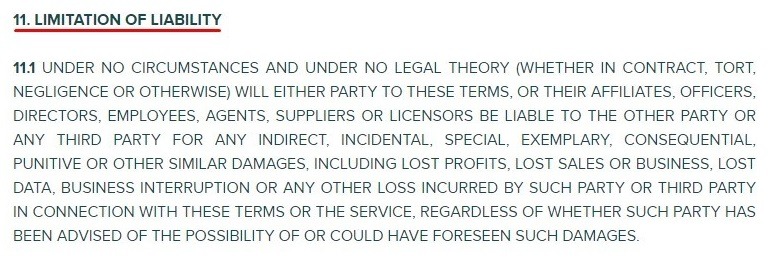
Intellectual Property Rights
When you include a clause that covers intellectual property rights within your T&C, it establishes ownership over the intellectual property contained on your website. It also prohibits visitors from using your property without permission.
Examples of intellectual property this clause can help protect are:
- Proprietary algorithms
- Copyrighted material
- Trademarks
- Other elements that make your website, app, or service unique to your business
This clause also informs users that any use of your intellectual property without your permission is an infringement and something for which they can be held liable in court. Moreover, you can terminate their access to your services.
As you can see below, Forbes makes no bones about its willingness to take users to court if its intellectual property is infringed:
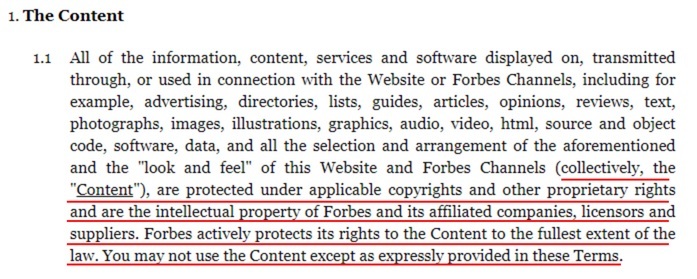
Termination of Accounts or Service
Most Terms and Conditions agreements will contain a termination clause that allows the company in question to close down the accounts of users who violate it. You can be quite broad in your language, maintaining the right to terminate an account for any reason at all or you can be explicit.
The New York Times, for example, goes the broad route, allowing visitors to terminate their own accounts at any time and and for any reason while reserving the right for it to do likewise:
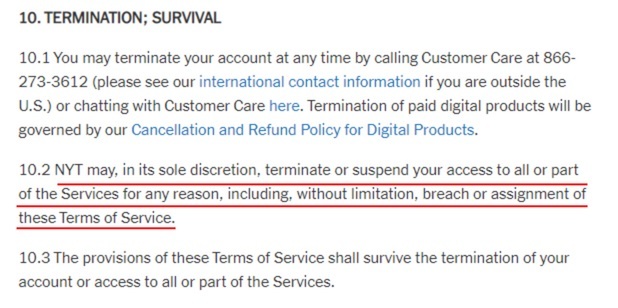
As you can see, having a Terms and Conditions agreement can really help keep your users informed about your rules and their rights, while helping protect your own rights and limit your legal liability.
An End-User License Agreement

An End-User License Agreement (EULA) is a legal page employed by software companies that grants a limited license to use software, and defines precisely how its software may and may not be used.
In most cases, EULAs are displayed to users during the installation process and must be agreed to before the software's installation is completed.
This type of legal page isn't a legal requirement, but it is essential for software developers because it allows them to set the rules before users, in essence, make a copy of copyrighted software when they download and install it.
As with other legal pages, an EULA has specific clauses that are commonly used.
License Granting
The main purpose of EULAs is to give end users a license to use the software in question. It, therefore, must contain a clause that specifically states a license is being granted.
In the example below, the Opera browser EULA explicitly states that it grants only a limited license for use and specifies what those limitations are:
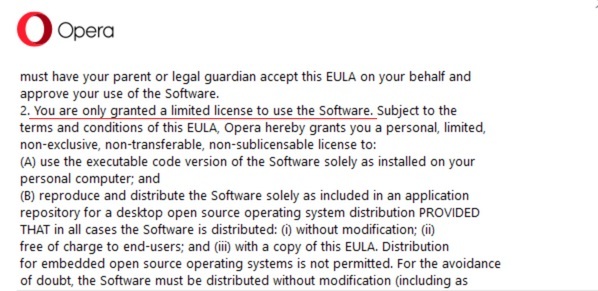
Intellectual Property/Copyright Infringement
In many ways, an EULA is similar to a Terms and Conditions agreement. It also commonly contains similar clauses. A clause protecting the software developer from copyright infringement or theft of intellectual property is one of them.
In the case of software, infringement is common. Thus, these clauses must spell out what happens if and when that occurs:
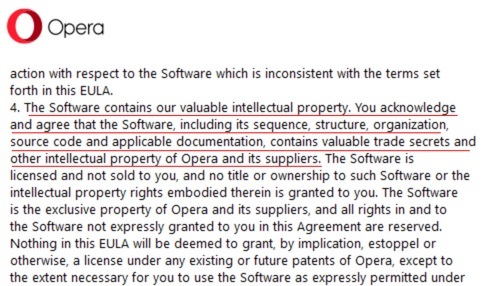
Termination of Licensing
In the event that an end user violates the EULA, it's essential that the software developer retain the right to terminate the license. In most cases, the language typically used gives the software developer the right to terminate a license for any reason and at its sole discretion:
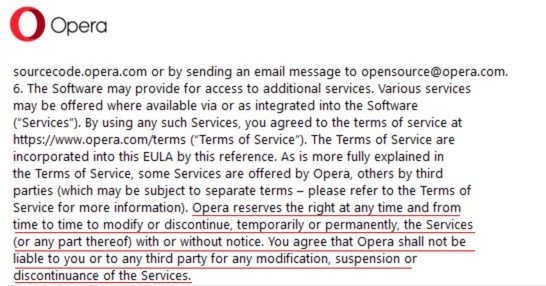
If you distribute software or mobile apps, an EULA is a key legal page that you should have. Not only will it help inform your users of their rights, but you will be able to maintain control over your licensing.
A Cookies Policy

Companies use a Cookies Policy to let users know about the types of cookies their websites use, how they use them, and how visitors can allow or prevent these websites from placing cookies on their electronic devices.
Sometimes a Privacy Policy will have a clause that covers the use of cookies. However, if you do business in the European Union or UK, you should have a completely separate Cookies Policy.
An excellent example of this can be seen in the way Amazon used to employ two different footers for its American and British websites. Note that the U.S. version only has a Privacy Notice that contains its clause on cookie use, while the UK version has a link to an entirely separate Cookies Policy (also called a Cookies Notice).
The U.S. version looked like this:
![]()
In contrast, the U.K. version looked like this:

Below, we'll cover some of the more important clauses typically used in a Cookies Policy.
What Cookies Are
This is a clause that simply answers the question, "What are cookies?" It gives all readers a common understanding concerning the nature of cookies before moving on to rules governing their use.
For example, the NatWest Group begins its Policy like this:
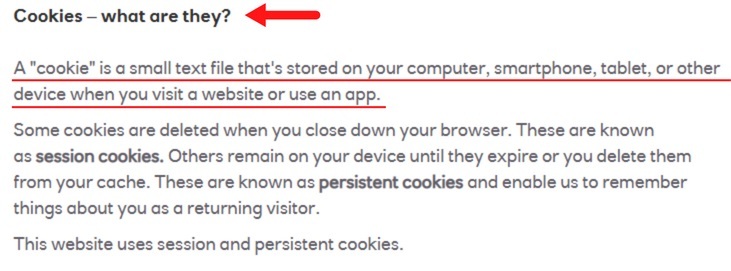
What Types of Cookies You Use
A Cookies Policy must let users know what kinds of cookies you may place on their digital devices. It will also let users know what the cookie's purpose is so that they can make an informed choice as to whether to allow or disallow them.
The NatWest Group goes into detail on each type of cookie it uses, such as essential, functional, and performance cookies:
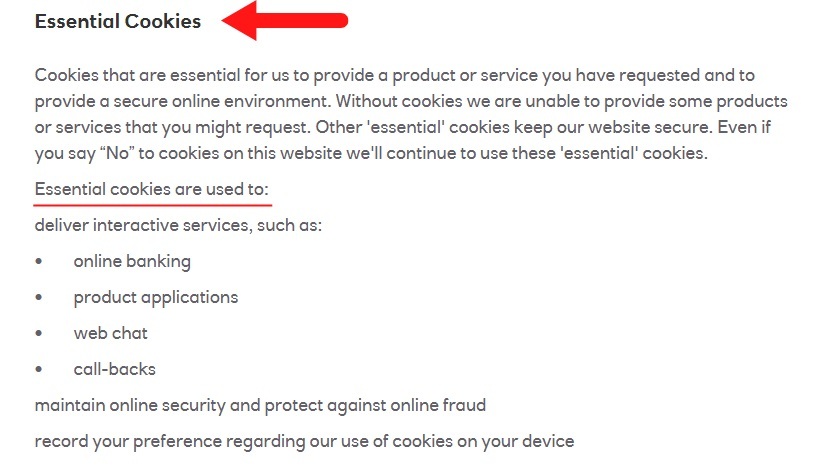
How Users Can Opt Out of Cookie Use
Users must be given the option to allow or disallow the use of cookies on their digital devices. A clause in the Cookies Policy should provide users with the information they need to understand precisely how to do this.
Here's an example of a clause about this subject:
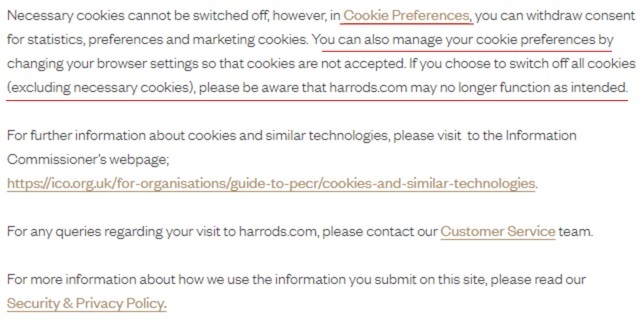
If you use cookies and have international users, you should post a complete Cookies Policy on your website and within your mobile app. Link it to your Privacy Policy as well, since users will know to look there for related legal page links.
Return and Refund Policy

A Return and Refund Policy is a legal page that describes your company's policies, processes, and requirements for accepting returns.
Although they are not legally required by any federal law within the United States, some areas do regulate aspects of these legal pages for businesses that wish to enforce certain terms.
Below are some of the common clauses ecommerce stores place within their Return and Refund policies.
Your Conditions for Accepting Returns
A clause describing the conditions under which your business will accept returns is a common feature in Return and Refund Policies. It should specify things like whether you accept the return of certain types of goods, as well as the time frame the customer has to return items.
For example, here's an example of how you can let customers know they will be charged a 20 percent service fee if they don't return items in their original packaging:

The Type of Refunds You Provide
A clause describing the sort of refund you provide is also common. For example, you should state whether you will refund your customers with in-store credit or a full return of money. You must choose between the two if you run an ecommerce store.
This clause specifies that customers will get a refund using the same method they used to pay:

Any Fees Associated with Returns
A Return and Refund Policy should have a section that lets users know if there are fees associated with returns, such as restocking fees, or if the customer is responsible for return shipping costs.
Here's how Autograph Foliages discloses that it charges its customers a 20 percent restocking fee:
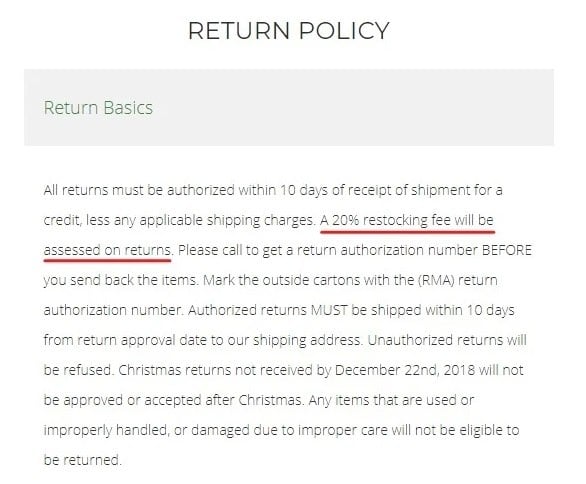
Be as detailed and clear as possible about your requirements and restrictions when you create your Return and Refund Policy. This make potential customers more likely to become actual customers. It will also help save you time with needing to answer a lot of customer questions, while keeping your customers less frustrated when they may already be unsatisfied and seeking a return.
A Disclaimer Page

Disclaimers inform your users of important limits on your liability, and of key facts regarding the limits of your relationship with them. For example, a medical disclaimer lets users know that while your blog may cover medical topics, you are not giving medical advice, you are not in a doctor-client relationship with blog readers, and you are not to be held liable for anyone taking your information, using it and having bad health results.
Some disclaimers are legally required, such as disclaimers for affiliate marketing content.
Having a legal page where you include all of your disclaimers will be a great addition to any website or blog, and will help users find all this important information in one place.
Here are some common types of disclaimers that you can display on your website, blog, videos or other content.
Use at Your Own Risk Disclaimer
A Use at Your Own Risk disclaimer will state that anyone who uses your content is taking full responsibility and all legal liability for doing so. This disclaimer can help limit your legal liability in the event that someone uses your information and has bad or negative results.
This is a great general disclaimer for limiting all liability, as it can apply to instructional content, medical content, financial advice content and pretty much any content that a user may "use," possibly to his detriment.
Here's an example of a general Use at Your Own Risk disclaimer:

Errors and Omissions Disclaimer
An Errors and Omissions disclaimer can help protect you in the event that some of the information you share is incorrect or incomplete. Typically, these disclaimers will state that the site owner does her best to ensure the content is accurate and complete, but that there is no guarantee of such.
Here's an example:
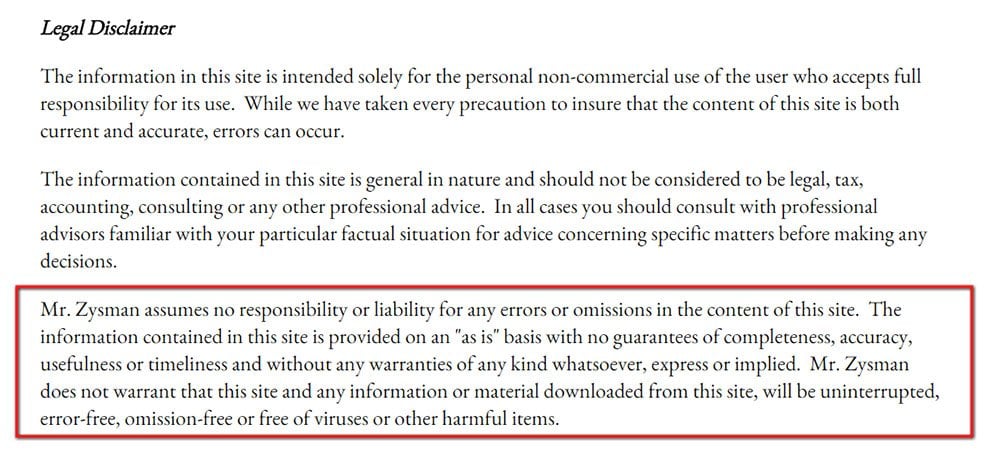
If you work with information that changes often, such as news, legal information, medical advice or financial market analysis, this type of disclaimer can be a great asset for your Disclaimer page.
Views Expressed Disclaimer
A Views Expressed disclaimer is great to have if you run a personal blog that shares your opinions, thoughts and personal insights into topics. This disclaimer helps ensure that your personal views being expressed on your blog or website won't be misconstrued as being those of any organization, business or individual that you may be associated with.
Some organizations, companies and universities may even require staff who maintain personal websites to include such disclaimers on the content, and will likely include one themselves, just to make sure there is no confusion as to the content's connection.
Here's an example from Rigaku of how to include "views expressed" language in a disclaimer:

Summary
Legal pages are an important and sometimes legally required component of websites, blogs, mobile apps, software and much more. No matter what industry you're in or what your product is, at least one of these legal pages are likely necessary for you to have.
The most common legal pages and what they accomplish are as follows:
- Privacy Policy: Lets users know what personal information you collect, how you collect it, why you need it and what their rights are with any of that.
- Terms and Conditions agreement: Sets out your rules, restrictions and disclaimers for anyone who uses your site or service.
- EULA: Grants a user a license and sets out your limits on that license use.
- Cookies Policy: Lets users know what types of cookies you use, why you use them, and how users can limit any of this or withdraw consent.
- Return and Refund Policy: Sets out your parameters for accepting returns and issuing refunds, such as what condition the item must be in, what time frame the return must be made within and what form you issue a refund in.
- Disclaimer page: Shares important information that limits your liability.
These legal pages can elevate your website or mobile app with professionalism, trustworthiness and legal compliance.

Comprehensive compliance starts with a Privacy Policy.
Comply with the law with our agreements, policies, and consent banners. Everything is included.
